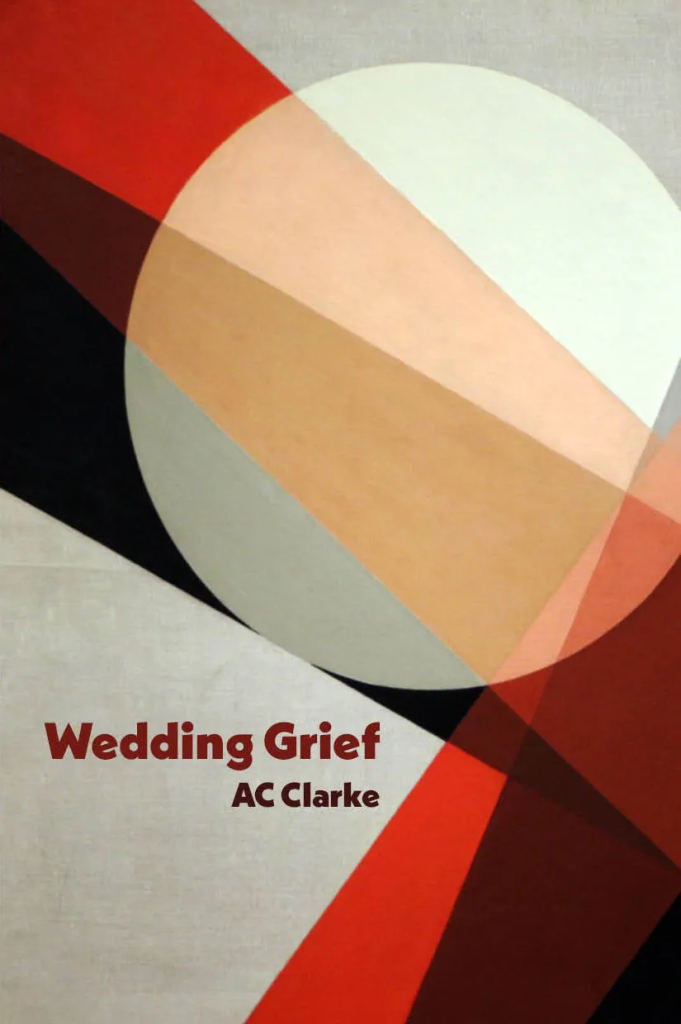Wedding Grief
AC Clarke
(Tapsalteerie, 2021); £5
Wedding Grief is an astutely chosen title; it encapsulates the fraught, traumatic relationship between Paul Éluard and his wife, Gala Diakonova, from meeting in a TB Sanatorium during World War 1 to the eventual ménage à trois with Max Ernst, and their eventual divorce.
AC Clarke’s award-winning hand works fully within this collection. Her work of three years wraps within itself inversions and extrapolations of grief and trauma, shifting between perceptions, tones, and meanings. Non-linearity characterises the collection, the titles of poems sit ordered solely by part, the disjointedness producing glimpses across their lifetimes. Only ‘Poet at war’ keeps the poetry marching in roman numerals.
The collection’s titles shift between distinct events, vague sequences, and abstract, distanced emotion, as in ‘Porcelain’. These ever-shifting titles create faltering senses of space and time, and traumatised delusions in ‘vi’:
Men build their palaces in air
the limp grey air
that wraps these dying fields.
Each poem bears witness to shock and trauma, violence pulsing throughout, whether it be Gala’s isolation in bustling Paris, or Paul’s time on the warfront. ‘Battle’ offers particularly grim imagery.
His heart hangs on a tree exposed
like soldiers blackening on the wire.
The couple’s pre-war love and passion are displayed; in ‘Gala and Paul in the sanatorium’, the imagery twists in time and narration, braiding into their illness.
He spits into his mother’s handkerchief
the candour of his breath red pearls
love fountaining among the snows[.]
Clarke’s linguistic skills of translation appear in the fragments of French throughout the collection, hinting at the couples shared interconnectivity with poetics and literature, and the romance that bloomed from it. These hints add to the collection’s tragedy, as with ‘Question’, where ‘All roads lead away from bookshops’, in their wartime lives.
In this dissolution of joy, Clarke foreshadows their eventual separation; in ‘Russian Book’, Gala summons courage to face reality, dampening any possible hope.
Books drew them to each other. Books show them ways to live. But in the end they must step out of books into the noise of the world.
Indeed, Clarke’s narration twists their love and courage back on themselves, darkening their bright, young fancies with harsh realities, as in ‘Fiancés’, a bleak telling of their separated future:
He is forever hers. He will write it
in every letter all his life.
Together, alone, with other women.
She is forever his. She will write it
in fifteen letters for a year.
After that the silence of ashes.
In these same inversions, imagery shifts, morphing, matching the figures deformed attitudes and moods. Birds are at once conveyed as hope for home, love, and freedom, but compounded with fleetingness and horror, as within ‘iv’:
Today he passed the ruins of a man.
A brood of fledgling ringdoves cooed
from the tree which shadowed him.
This fleeting hope is darkened ever more with Gala—her distancing as ‘she plans abandonment’ in ‘Gala en voyage’ for what she’d previously loved so dearly, and within ‘Child’, which bears her perceptions of their new-born ‘parasite’ daughter. Gala’s cracking, bruised psyche is displayed, the depths of her entrapment shown.
The later affair with Max Ernst is portrayed as a betrayal in ‘Marriage’, with Gala and ‘the sweet/ poison of her wedding kiss’, the wrapping of ‘their nakedness/ in warmhearted lies’ developing into the toxicity of the ménage à trois in ‘After Paul Éluard’;
Incest – two brothers circle their soul-sister
in her dress green as a cypress
like wrestlers looking for a hold.
The competitive, potent, twisted intimacy displays all the hallmarks of the impossibility of a happy resolution. Gala’s freedom is that of the birds—fleeting, born around fear and trauma—leaving Paul behind in his despair, ever hoping for their impossible reconciliation, as with the collection’s end in ‘Escape’.
He puts out seeds for the bird cool water
she will not be lured back[.]
James McLeish


Many thanks James for this very thorough and perceptive reading of my book. I am delighted that you have understood how I was trying to present Gala, a frequently vilified woman in later life, which was in response to how Paul Eluard himself presents her in his poems. I’m grateful too that you have read it with such close attention and grasped the fluid, shifting nature of the work, again a response to Eluard’s own. It’s rare, in my experience, to get reviews that pay such attention to the text.
Thank you so much for such a flattering responce!
It was a delight to read, and a very interesting piece to study. I’m looking forward to seeing what you produce in the future.
Thank you James. I don’t know if this link is still open but, two years later I can let you know what my next collection will be. I have a new collection Alive Among Dead Stars coming out with Broken Sleep Books at the end of the year. It’s not a collection of poems so much as a fluid narrative drawing in part on surrealist techniques to explore the lives and preoccupations of Paul Eluard (the title is from one of his poems) and his circle against the political backdrop of interwar Paris. It’s a sequel in a way to Wedding Grief.
I’d be happy to send you a copy in MS and even happier if you felt you could say something positive about it, though I realise I am trespassing on your time.
Best wishes
A C